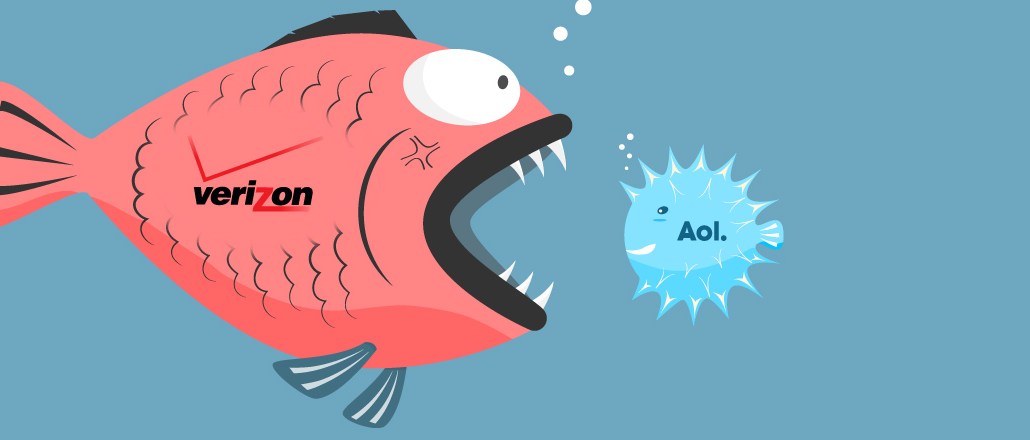
Tim Armstrong finally got his deal. The AOL CEO announced this morning that it’s being acquired by Verizon for $4.4 billion, a deal that gives a AOL a deep-pocketed new owner and Verizon a viable ad tech and video platform.
Here’s what you need to know about the deal.
It’s all about the ad tech. And data.
The AOL of 2015 is very different from the AOL of 1999. While the company still gets declining-but-significant chunk of its revenue from dial-up customers, CEO Tim Armstrong has quietly and successfully transformed AOL into a media and ad tech company over the past few years. Since 2013, AOL has shelled out $638 million on a series of ad tech companies that includes Adapt.tv, Gravity, Convertro and Vidible. That’s in addition to a raft of pre-Armstrong ad tech assets previous regimes acquired. The result is an end-to-end AOL ad tech stack that includes ad serving, personation, attribution, programmatic video and mobile. Agencies are fond of the approach. “What they’re doing makes a lot of sense. It fits well with how agencies and the industry is moving,” Danielle Sporkin, Essence digital director of investment and partnerships, said in January.
The shift has been good news for AOL’s bottom line. First quarter revenue for AOL’s ad tech division climbed 19 percent year-over- year to $231.6 million. It pays to be a platform.
Verizon wants a bigger video presence.
Video is another area where AOL has become a formidable force. Since the 2013 debut of AOL Originals, its first video series, AOL has invested heavily into the format with a video lineup that has included big-name Hollywood talent such as Sarah Jessica Parker, Steve Buscemi, Nicole Richie, James Franco. Video is also core to Huffington Post Live, the site’s streaming live news program. AOL’s video investment isn’t surprising. Digital video spend is expected to increase to $7.77 billion this year as more television dollars shift to the Web. AOL, and now Verizon, wants a bigger cut of it.
Verizon doesn’t want to be a dumb pipe.
Verizon’s stake in both AOL’s ad tech and video businesses shows that the company wants to be more than just a dumb pipe for other companies’ content. Telecommunications, like every business, fear commoditization, which cuts into their margins and renders them invisible in the eyes of consumers. Verizon, which says it wants to give its customers “a premium digital experience based on a global multiscreen network platform” wants to profit from content, not just transmit it.
The future of AOL’s publishing business is hazy.
While Verizon’s interest in AOL’s ad tech and video operations makes sense, less certain is the future of AOL’s publishing business, which includes The Huffington Post, TechCrunch and Engadget. Publishing is a notoriously hard-to-scale business, and it’s not clear how core AOL’s sites will be to Verizon’s plans. (Verizon, which shuttered its own failed content venture SugarString last December, has not had the best history with publishing.) AOL has already pared down its content sites in preparation for the sale. Joystiq, its gaming site, and TUAW, its Apple site, were both folded into the Engadget brand in February — which might not bode well for the rest of AOL’s properties. Armstrong, however, said that AOL is invested.
“The deal will give our content businesses more distribution and it will give our advertisers more distribution and mobile-first features,” he said internal memo on Tuesday. “The deal will add scale and it will add a mobile lens to everything we do inside of our content, video, and ads strategy.”
Don’t worry: Shingy is safe
AOL’s digital prophet will now be Verizon’s digital prophet, apparently.
Photo illustration by Matthew Fraher
More in Media

In Graphic Detail: The scale of the challenge facing publishers, politicians eager to damage Google’s adland dominance
Last year was a blowout ad revenue year for Google, despite challenges from several quarters.

Why Walmart is basically a tech company now
The retail giant joined the Nasdaq exchange, also home to technology companies like Amazon, in December.

The Athletic invests in live blogs, video to insulate sports coverage from AI scraping
As the Super Bowl and Winter Olympics collide, The Athletic is leaning into live blogs and video to keeps fans locked in, and AI bots at bay.





